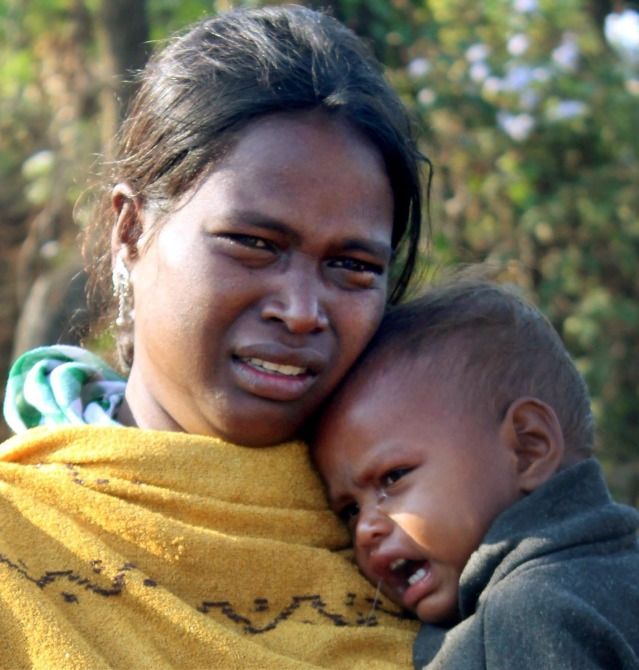It is possible that the December clashes in Assam merely exploited an issue simmering for decades. The motivation, however, was something else, says Aditi Phadnis
Presumably in the interests of factual reporting, Assam newspapers published a full list of those who died in the Bodo-Adivasi clashes in Assam in December.
Dead from gunshot wounds at Ultapani were Karnilian Murmu (5), Lakhi Soren (12), Lupsri Kisku (3), Takur Soren (70), Pindula Soren (60), Pulmoni Tudu (70) and Paran Murmu (1), among others.
What opinion could a five-year old or a one-year old have on the establishment of a sovereign state -- Bodo or Adivasi?
As in all ethnic clashes, the killings appeared, prima facie, to be senseless.
Of the 80 bodies found so far, more than 40 are those of children, women or men above 60.
Soft targets, in other words, hunted down, many shot at point-blank range.
The location of the clashes is also puzzling.
The areas where the Adivasis were killed (retaliation followed) were either in that part of Assam that borders Bhutan; or the Assam-Arunachal Pradesh border. These are extremely remote; and also on the outer fringes of the region known as Bodoland.
So somebody, probably hired guns, attacked these villages picking out targets that they knew would not fight back, and having created confusion and terror, slipped out of Assam to vanish either into the Garo hills or Bhutan.
As Adivasi families grieved and wailed, the state government was thrown into a panic, rushing troops and weapons to quell a militant group that all observers agree, is no more than 200 strong.
The targets then, were two: the Adivasis; and the state government led by third term Chief Minister Tarun Gogoi.
The killings, according to the state government, were carried out by the National Democratic Front of Bodoland (Songbijit).
To understand how this group came into existence, a quick recap of events over the last few decades would help.
The Bodos (currently about 36 per cent of Assam's population) consider themselves a persecuted minority in Assam and believe they deserve a separate region. To "help" the Bodos in their struggle for a homeland, successive Congress governments in Assam gave them moral and material assistance, sometimes covertly.
The Bodos became a useful counterpoise against the Assam Gana Parishad.
Later, the Congress tried to make good on its promise and a Bodo Territorial Autonomous District was granted to them. This was a notional homeland: because neither the Bodos who occupied the region nor the Adivasis nor the Muslims had any land rights. They don't, till today.
As a result, the Bodos have political power and wealth on the strength of arbitrage and rental income (largely from the funds that flow in for the development of the BTAD), but no real economic power. The other groups don't even have that.
The leader of the militant Bodos was Ranjan Daimary. With his followers, he came overground but a split in the outfit caused the more militant of the Bodos -- those elements which later became hired guns -- to band under Songbijit Ingti Kathar. Ironically, Songbijit Kathar isn't even a Bodo -- he is a Karbi. It is his group that has carried out the mayhem in the Adivasi areas in December 2014. He himself is said to be in Myanmar.
But here's the twist in the tale.
For years in the north-east, political parties and chief ministers have, through the top police bureaucracy, patronised one or other militant group.
We still don't know the full details and dimensions of the Saradha scam in Assam, but the Ponzi scheme may have been used to launder money as well.
The country was shaken awake when former Director General of Police Shankar Barua killed himself a day after the Central Bureau of Investigation questioned him in the Saradha scam. After that, the police headquarters in Assam has issued a circular saying that no cases should be registered in the Saradha scam without "prior approval from appropriate levels in the PHQ".
In November, former Assam Education Minister Himanta Biswa Sarma appeared before the CBI in Kolkata in connection with the Saradha scam.
Did the Bodo-Adivasi clash have something to do with the Saradha scam? A former Home Secretary was succinct.
He said "Anything is possible in Assam".
He recalled that a top police official in Assam who had access to endless slush funds (meant for informants) tried to mislead the home ministry on the circumstances of an attack on a place of worship. When then Home Minister P Chidambaram tried to investigate the "leads" offered by the official, they were found to be fake.
Justifications were offered by him on the use to which the slush funds were put. Smelling a rat, the Union home minister tried to get the official moved out. He couldn't.
In these circumstances, it is possible that the December clashes in Assam merely exploited an issue simmering for decades.
The motivation, however, was something else.
What it did succeed in doing was to badly shake the already fragile Tarun Gogoi government. The question to answer is: who gained from that?












 © 2025
© 2025